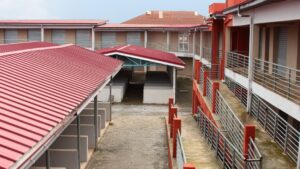
Justice Kwasi Anin-Yeboah, Chief Justice designate
Justice Kwasi Anin-Yeboah, Chief Justice Designate, on Monday told the Appointment Committee of Parliament (ACP) that he will ensure that the justice system is fair to all Ghanaians when approved to that positon.
Parliament, originally scheduled to rise for the Christmas holidays on Saturday, December 21, 2019, added an extra day, and sat on Monday, December 23, 2019, focusing primarily on vetting of Chief Justice Designate.
It held a closed-door meeting to consider the performance of the nominee and bring a report to the plenary to either approve the nominee or otherwise.
If approved, Justice Anin-Yehoah, nominated by President Nana Addo Dankwa Akufo-Addo on December 12, 2019 to the position of Chief Justice, would succeed Chief Justice Sophia Akufo, who retired on December 20, 2019.
Reforms
Justice Anin- Yeboah envisaged a number of reforms in the Judiciary, including; legal education, housing for staff, automating and equipping the courts, and more visibility of courts and personnel at the lower levels of justice administration to reduce or avoid saddling the higher courts with more cases.
“I will try and see if all cases can be worked on and done away with in earnest” Justice Anin- Yeboah said, adding that he would ensure that the justice system continued to cede some aspects of justice administration to traditional authorities.
He promised to ensure the dignity of accused persons, insisting that a police has no power to assault or insult persons arrested.
Motivation
Justice Anin- Yeboah advocated motivation of judges, especially for those at the lower benches, as was done in Sweden.
Bemoaning the state of the structures for courts, the nominee appealed to the District Assemblies to renovate the courts in the country, and build new ones.
“Districts Assemblies should know that it is their business to put up courts for us. In any case, all over the world, it is the executive, which provides the judiciary with infrastructure,” Justice Anin-Yeboah said, and appealed to Parliament to encourage the various district assemblies to invest in setting up more courts nationwide.
Judges, he said, should also be provided with accommodation as a way of motivation, “as some of them joined the service late when they are within their 50s and have about four, five children.
“So then if you want a circuit judge to live comfortably, and you give him maybe four-bedroom flat bungalow, he will be more than okay.
“It is my passionate plea that the district assemblies do more than they are doing.”
Dressing
On the dressing of legal practitioners wearing wigs, gowns and suits, Justice Anim Yeboah, said he would not go to change the practice, which was criticised as a remnant of our colonial past, which should be done away with, and also not friendly in the tropical weather.
Justice Anin-Yeboah said even if he’s given clearance to become Chief Justice, the tradition would remain unchanged.
“That’s our uniform. I’m all out for the tradition of the bar. I will not change it,” he said.
Football connection
When asked by Mr Edwin Nii Lante Vanderpuye, MP for Odododiodoo Constituency, on his position on Chairman of the FIFA Disciplinary Committee when the House approves him, Justice Anin Yeboah said once his nomination is approved, he would resign from his various roles at football governing body.
The nominee currently serves as a member of the Reform Task Force of FIFA/CAF for Organisation of African Football in addition to his role as the Chairman of the FIFA Disciplinary Committee.
On the appointment of two members of the Bar Association to the Judicial Council, Justice Anin-Yeboah said the two were insufficient, and the number could be increased to three.
He described as worrisome the social media communication, where information was put out and soon retracted, and said that could be addressed by legislation.
Declaration of Assets
Justice Anin-Yeboh said he did not declare his assets and liabilities when he was appointed to the High Court and Court of Appeal, a requirement under Article 286 of the 1992 Constitution of Ghana, for judges of the superior courts declare their assets and liabilities when they assume office.
He said he first declared the assets at the instruction of then Chief Justice Theodora Wood, when he was appointed to the Supreme Court in June 2008.
”When we were appointed, it was the Chief Justice, who instructed that we should be furnished with the forms,” he explained.
And after his nomination by the President, “Last week, I filed it at the Auditor-General’s office,” Justice Anin-Yeboah said, but as he climbed the ladder in the Service, he did not declare his assets on the two occasions.
“It has not been very easy for judges to comply because it comes to the performance of our duties, even the submission of our tax returns should be done by the Accounts Section of the Judicial secretariat.
He refused to accept an interpretation of the law, when Alhaji Muntaka Mohammed-Mubarak, a member of the Committee said judges had to declare their assets and liabilities every four years, and with reference to Article 286 (1)(c), he said nowhere was it clearly stated that he had to declare his assets and liabilities every four years.
“Please, I am still serving the Judiciary. My tenure has not ended. On being appointed as a Supreme Court judge, I did,” he said.
He said the Constitution was supreme to any act, Act 550 which provided guidelines on asset declaration.
Petition
That bit of the vetting came against a petition by Mr Mensah Thompson, a citizen of Ghana, to the Commission on Human Rights and Administrative Justice (CHRAJ), challenging the eligibility of the nominee for the position on the grounds that nominee had not declared his assets and liabilities as required by law when he became a Court of Appeal judge.
GNA








